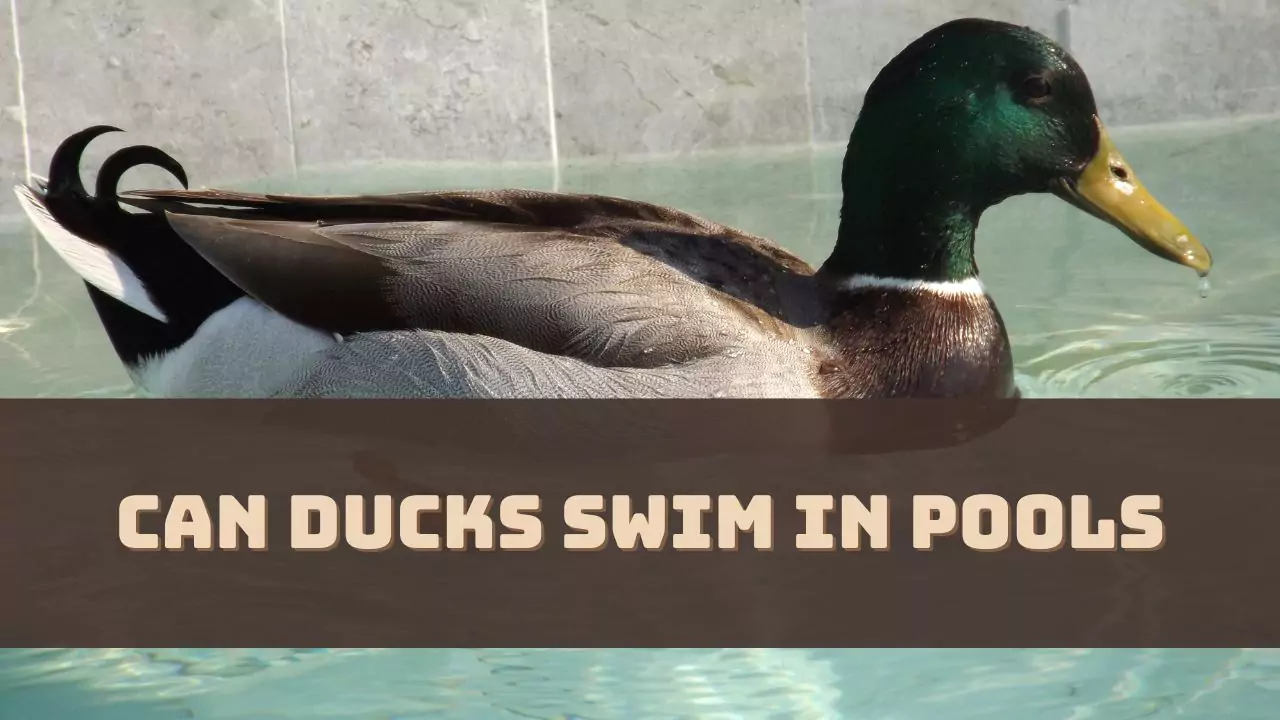Yes, Ducks are indeed capable of swimming in pools, including those treated with chlorine. While they can navigate and swim in chlorinated water, it’s not recommended for them to spend extended periods in such environments.
Ducks are generally not harmed by chlorine pools, but ingesting large amounts of chlorine could potentially harm their internal organs. Therefore, while they can swim in pools, it’s best to limit their exposure to chlorinated water for their health and well-being.
What is the Risk of Ducks Swimming in Pools?
If a duck is allowed to swim in pool water, then it can lead to respiratory distress, conjunctivitis, and skin irritation and these are all side effects of exposure to chlorine water. The more time the duck spends in the water, the more its health will deteriorate. Also, ducks can sleep and fall on the surface of the pool due to its smooth and slippery nature, leading to injuries.
High Walls of the Pool
High walls of swimming pools have risks for the ducks as they create many obstacles. The duck might not be able to climb out of the high walls of the pool which increases the chances of drowning. So, you need to provide them with steps or ramps to help them out.
Feel Disoriented
Chlorine is a prime chemical element which is used to sanitize the pool. Chlorine can also make the duck tired and disoriented, increasing the chances of a fatal incident. So, you need to constantly monitor the ducks, when they are inside the pool.
Exposure to Chemicals and Bacteria
Pools also expose them to harmful chemicals and bacteria which leads to diarrhea, dehydration, and other digestive issues. Ducks easily contract diseases from pools due to the poor quality of water and it can also affect the health of the entire duck population. So, it is the duty of the pool owner to maintain the quality and keep the pool water safe for the well-being of the duck.
What are the Reproductive Risks for Ducks When Exposed to Chlorine?
When a duck is exposed to chlorine, it creates a hormonal imbalance. It affects their reproductive health negatively. Chlorine also affects the fertility and quality of egg production among the ducks. There is a reduction in the number and size of eggs and there may also be a decline in egg production. Exposure to chlorine can lead to the risk of reproductive disorders and the eggs might be deformed.
What are the Benefits of a Duck Swimming in a Pool?
If a duck is allowed to swim in a pool, then provide a special and controlled environment that helps strengthen their muscles and get enough exercise. Especially during hot weather, if a duct is allowed to swim in a pool, then it regulates their body temperature.
What are the Alternatives of a Duck Swimming in a Pool?
To provide an alternative facility for the ducks to swim in, –
- You can construct a small pond which has natural vegetation and clean water making it a safe and suitable place for the water birds.
- You can also build a shallow kiddie pool or install a water feature to create a natural habitat for the ducks with freshwater and without any risk of chlorine infection.
- While creating the pool you need to consider the number of ducks that would be allowed to swim, this would also help them socialize.
- You need to keep 4 to 6 inches of water depth for the duck to swim comfortably. Remember ducks require additional area during a molting season when they preen their feathers, so provide them a shallow basin for them.
- Keep the pool under the shaded area and secure it from potential hazards. You have to clean it on a daily basis and use a non-toxic cleanser.
- You can create a pool made up of rubber, plastic, or any durable material that is easy to clean and maintain.
- You also need to create a stimulating environment that supports the ducks’ physical and mental health.
- Always refill the pool with fresh water, the pH balance should be between 7.2 to 7.8 and regularly tested to make necessary adjustments.
How to Stop the Ducks from Entering the Pool?
If you don’t want the ducks to enter the pool area, then –
- Install a high fence that acts as a physical barrier and prevents the ducks from entering the pool.
- To maintain their well-being and safety you can also educate the pool owners about the risk that involves when a duck enters the pool.
- Remove all the food sources from around the pool area that can attract the ducks.
- You can also use strategies like loud noises, jet spray, or motion-activated sprinklers to keep these waterbirds away.
- Installing decoys that look like predators or give the impression in the form of plastic alligators or herons is quite an effective measure.
- Try positive reinforcement and train the ducks to stay away from chlorine pool water.
Can Baby Ducks Swim in Pool Water?
It is not recommended for baby ducks to swim in chlorine water as they are more delicate than adults. The same chlorine pool can have adverse effects on them when compared with full-grown ducks. Ducklings are more susceptible to the harmful effects of chlorine.




